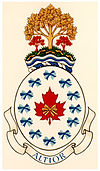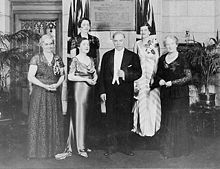- National Council of Women of Canada
-
National Council of Women of Canada 
The coat of arms of the NCWCAbbreviation NCWC Formation October 27, 1857 Type NGO Purpose/focus Social conditions Headquarters Ottawa Location Canada Region served Canada Official languages English & French President Mary Scott Main organ Board of directors Affiliations International Council of Women Website http://www.ncwc.ca/ The National Council of Women of Canada (NWCW, French: Conseil national des femmes du Canada, (CNFC)) is a Canadian advocacy organization based in Ottawa aimed at improving conditions for women, families, and communities. A federation of nationally-organized societies of men and women and local and provincial councils of women, it is the Canadian member of the International Council of Women (ICW). The Council has concerned itself in areas including women's suffrage, immigration, health care, education, mass media, the environment, and many others.[1] Formed on October 27, 1857 in Toronto, Ontario, it is one of the oldest advocacy organizations in the country.[2] Lady Aberdeen was elected the first president of the National Council of Women of Canada in 1893. Prominent Council leaders included Lady Gzowski, Dr. Augusta Stowe-Gullen, and Adelaide Hoodless.[3]
Contents
Founding
The IWC was founded in 1888 in Washington D.C., United States. By May 1893, the IWC World's Congress of Representative Women had met in Chicago and discussed creating a Canadian Council. The Council formally began its existence on October 27 at a public meeting at the Horticultural Pavilion of the Allen Gardens in Toronto. Over 1,500 women attended the meeting, which was chaired by Lady Aberdeen, wife of then-Governor General John Campbell Hamilton-Gordon, 7th Earl of Aberdeen. Lady Aberdeen served as the Council's first president until her resignation in 1899; she was succeeded by Lady Taylor.[4]
Activities
The Council serves an advisory role on issues based on existing organization policy. New policies are proposed as resolutions, which are developed through grassroots discussions on the local and provincial scale and are then debated and voted upon. If they are accepted, they become policies. The organization then creates briefs (formal papers based on policy), which suggest a course of action and are submitted to an official body, such as a government.
The organization has sent representatives to government boards and international bodies such as the League of Nations. The Council played a key role in creating the Victorian Order of Nurses, the Children's Aid Society, and the Canadian Association of Consumers.[1] It has also played a role in developing the Women's Bureau of Labour Canada, the Federal Bureau on Ageing, and supported the call for the Royal Commission on the Status of Women, which created the Canadian Advisory Council on the Status of Women.[2]
One of the Council's early causes was its fight for women's suffrage. Although members initially showed skepticism about universal suffrage, the Council pushed onwards until 1918, when the federal government granted women the right to vote in federal elections. In 1929, The Famous Five won Edwards v. Canada (Attorney General), commonly known as the "Persons case", which determined that women were "persons". Three of The Five were active members of the NCWC,[4] and the NCWC played a vital role in winning the case.[2]
Other causes include child welfare measures such as preventing child abuse, and encouraging education and good health care. General health measures include pasteurization, clean water, and medical inspections in schools. The Council has also fought controversial battles, such as broadening the grounds for divorce, wider availability of birth control information, removing abortion from the Criminal Code, and programs to protect and rehabilitate prostitutes.[4]
The organization holds Consultative Status (II) with the United Nations Economic and Social Council (ECOSOC).[2]
Notable members
 The Famous Five with Prime Minister William Lyon Mackenzie King in 1931.
The Famous Five with Prime Minister William Lyon Mackenzie King in 1931.
Several members of the Council have played prominent roles in Canadian history. Augusta Stowe-Gullen, one of the Society's founding members, was the first woman to earn a medical degree in Canada and was an important figure in the women's suffrage movement. President Winnifred Kydd was a delegate to the League of Nations, and in 1930, Cairine Wilson of the Ottawa Council became the first woman to be appointed to the Senate.[2] Each of The Famous Five (Emily Murphy, Irene Parlby, Nellie McClung, Louise McKinney, Henrietta Edwards) were members in the organization.[5]
References
- ^ a b "National Council of Women of Canada fonds". Library and Archives Canada. http://collectionscanada.gc.ca/ourl/res.php?url_ver=Z39.88-2004&url_tim=2010-05-22T15%3A32%3A48Z&url_ctx_fmt=info%3Aofi%2Ffmt%3Akev%3Amtx%3Actx&rft_dat=97640&rfr_id=info%3Asid%2Fcollectionscanada.gc.ca%3Apam. Retrieved 2008-09-02.
- ^ a b c d e "National Council of Women of Canada". The Canadian Encyclopedia. http://www.thecanadianencyclopedia.com/index.cfm?PgNm=TCE&Params=A1ARTA0005614. Retrieved 2008-09-02.
- ^ Pound, Richard W. (2005). 'Fitzhenry and Whiteside Book of Canadian Facts and Dates'. Fitzhenry and Whiteside.
- ^ a b c "About Us - History". National Council of Women of Canada. http://www.ncwc.ca/aboutUs_history.html. Retrieved 2008-09-02.
- ^ "About Us - Achievements". National Council of Women of Canada. http://www.ncwc.ca/aboutUs_achievements.html. Retrieved 2008-09-02.
External links
Categories:- Non-governmental organizations based in Canada
- Organizations based in Ottawa
- Organizations established in 1893
- Women's organizations in Canada
Wikimedia Foundation. 2010.
